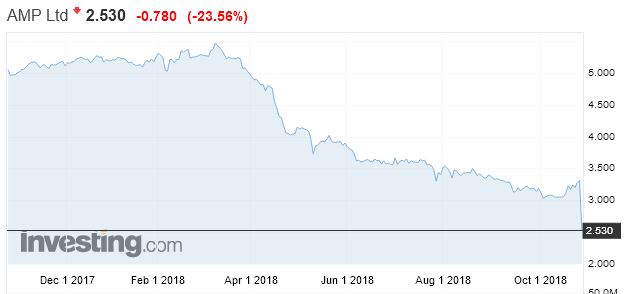AMP Limited has announced the successful completion of its portfolio review including an agreement to divest its Australian and New Zealand wealth protection and mature businesses (AMP Life) and reinsure New Zealand retail wealth protection for total proceeds of A$3.45 billion.
The stock dropped (in a down day) to a new low.

- AMP will exit its Australian and New Zealand wealth protection and mature businesses via a sale to Resolution Life1 for total cash and non-cash consideration of A$3.3 billion; transaction expected to complete in 2H 2019; subject to regulatory approvals.
- Binding agreement with Swiss Re2 to reinsure New Zealand retail wealth protection, releasing additional capital of up to A$150 million to AMP prior to completion of sale; subject to regulatory approvals.
- Intention to seek divestment of New Zealand wealth management and advice businesses via initial public offering (IPO) in 2019 subject to market conditions and regulatory approvals, unlocking further value.
- Significant capital release will strengthen AMP’s balance sheet and provide strategic flexibility; all options for use of proceeds to be evaluated and update to be provided following transaction completion.
Wealth protection and mature – Resolution Life transaction summary
Under the terms of today’s agreement, AMP will sell its Australian and New Zealand wealth protection and mature businesses (AMP Life) to Resolution Life for a total consideration of A$3.3 billion, which comprises:
- A$1.9 billion in cash.
- A$300 million in AT1 preference shares in AMP Life (issued on transaction completion).
- A$1.1 billion in non-cash consideration:
o Economic interest in future earnings from the mature business, equivalent to A$600 million; expected to provide steady ongoing earnings to AMP of approximately A$50 million after tax per annum, assuming an annual run-off at 5 per cent.
o A$515 million interest in Resolution Life, focused on the acquisition and management of in-force life insurance books globally.
AMP expects to monetise all non-cash consideration over time.
Together with the New Zealand reinsurance agreement, the total value equates to approximately 0.82x pro forma embedded value of the sold businesses at 30 June 2018, excluding franking credits.
Resolution Life assumes risk and profits of the wealth protection and mature businesses from 1 July 20183, subject to Australian wealth protection risk-sharing arrangements.
A new relationship Agreement has been established with Resolution Life and AMP Capital will continue to manage wealth protection and mature assets under management. AMP Capital will also join Resolution Life’s global panel of preferred asset managers.
The transaction is subject to regulatory approvals and other conditions precedent and is expected to complete in 2H 2019.
Partnering to ensure smooth transition for customers
Resolution Life is an international insurance and reinsurance group whose management has a 15-year track record in providing quality service to in-force insurance customers.
The transaction has been designed to ensure all existing terms and conditions will be retained. The teams supporting existing AMP customers will largely transfer on completion to maintain continuity of service.
AMP and Resolution Life will work closely together to ensure a smooth transition for customers.
New Zealand wealth protection reinsurance
AMP has entered into a binding reinsurance agreement with Swiss Re for the New Zealand retail wealth protection portfolio which is expected to release up to A$150 million of capital to AMP, subject to regulatory approval. The agreement is expected to be effective from 31 December 2018, and will cover approximately 65 per cent of the New Zealand retail wealth protection portfolio for new claims incurred from that date.
The reinsurance agreement is expected to reduce New Zealand profit margins by A$20 million on a full-year basis. The reinsurance outcomes are factored into the Resolution Life transaction.
New Zealand wealth management and advice businesses
AMP is today also announcing its intention to seek divestment of its New Zealand wealth management and advice businesses via an IPO in 2019. The decision to proceed with an IPO and its timing remain subject to market conditions and regulatory approvals.
These businesses have FY18 pro forma operating earnings of approximately A$40 million on a standalone basis. The IPO would release capital to AMP and create a standalone New Zealand wealth management and advice business.4
Portfolio review outcomes will release capital, simplify portfolio and create strategic flexibility
The completion of the portfolio review will strengthen AMP’s balance sheet and provide strategic flexibility. All options for use of proceeds will be considered including growth investments and/or capital management activity.
The exit from Australian and New Zealand wealth protection and mature will also significantly simplify AMP and its earnings profile, enabling it to focus on its higher growth businesses of Australian wealth management, AMP Capital and AMP Bank.
The simplification and separation costs related to the Resolution Life sale transaction are expected to be in the order of A$320 million post-tax.
Additional capital from the transaction with Resolution Life will facilitate a reduction in AMP’s corporate debt of up to A$800 million.
The financial impacts of the transaction on AMP post-separation are outlined in the investor presentation.
AMP will exclude the 2H 18 earnings from the discontinued businesses in determining the FY 18 dividend. AMP continues to target a total FY 18 dividend payout within, but towards the lower end of its dividend guidance range of between 70 – 90 per cent of underlying profit.
Further guidance on use of proceeds will be provided following the completion of the transaction in 2H 2019.







